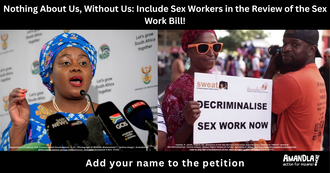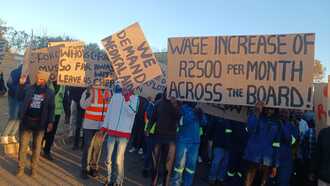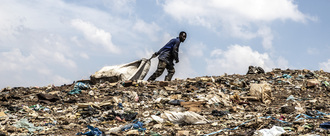- Featured
- Clean air
- Climate justice
- Consumer Rights
- Corporate Accountability
- Data access
- Early Childhood Development
- Economic fairness
- Education
- Electoral fairness
- Environmental justice
- Food justice
- Gender based violence
- Grants/social assistance
- Health
- Housing and infrastructure
- Industry interference
- Land Justice
- LGBTQIA+ rights
- Media/ information access
- Public transport
- Racism
- Reparations
- Safety
- Sanitation
- Service Delivery
- Sexual and Reproductive Rights
- Social justice
- Unemployment
- Womxn's rights/ gender equality
- Workers' rights
- More
-
We demand clean water and functional sewage systems in Dan Tloome and areas around itWhen the housing project began, it was intended to include sufficient greywater and sewage systems to serve the entire area; however, this has not been implemented. Currently, there are sewage problems in Dan Tloome, which also impact lower-lying areas near the housing project. As a result, when sewage overflows into stormwater pipes and contaminates boreholes—the only source of drinking water for these areas—our wetlands are polluted. The officials in charge of this housing project have failed, and continue to fail, the community of Dan Tloome and its surroundings, because residents are forced to live with poor sanitation conditions and drink contaminated water. There is no functioning sewage treatment plant in Randfontein due to a lack of maintenance, and it has been vandalised. Manholes are overflowing with raw sewage and flowing into nearby marshes, dams, and rivers, contaminating our underground drinking water. This supply is going to cause an outbreak of diseases and the killing of livestock. There is also a possibility that this spillage will end up in the Vaal River and dams, resulting in more people being vulnerable to diseases. Meetings were held with the municipality, and they assured us that they will keep a watchful eye on the situation to prevent any spillage. This was never done. Sewerage spillage had been active for many months and was not brought to our attention, remaining unreported for months until residents noticed the sewerage odour in the air and investigated. The situation has gotten worse now that it often rains. We need to come together and pressure the municipality into doing right by us. This is a clear violation of our human rights. We deserve clean water and functional sewage systems.425 of 500 SignaturesCreated by Carol Hefer
-
Provide Capricorn District Villages With Indoor Residual Spraying Once a YearPeople in the Capricorn district continue to experience discomfort and poor living conditions due to uncontrolled mosquito infestations. The municipality must take urgent action to provide proper mosquito control and improve conditions in the district. The Limpopo Department of Health recently advertised spray operator posts;[3] only 12 positions were advertised for the Capricorn district, which has over 400,000 households. While it is understandable that the Department of Health prioritises Mopani and Vhembe because they experience higher malaria cases, this focus overlooks challenges faced by other districts. The Capricorn district may not be suffering from malaria outbreaks, but it continues to live with severe mosquito infestations that affect their daily lives and comfort, which is not okay. “I have to use some of my grant money to buy mosquito repellent products, which won’t even last me a month”, these are the words of an elderly woman, Maggie Malebana from Moletjie, a village outside Polokwane. “Over 20 years ago, we used to have spray operators come to our homes to get rid of mosquitoes,” She added. Indoor Residual Spraying (IRS) has been one of Limpopo’s most effective ways to fight mosquito infestation for many years. The programme was introduced in 1932 and expanded in the 1990s through the Department of Health’s Malaria Control Programme.[4] Trained spray operators went door-to-door to spray once a year before the rainy season. Today, the IRS is limited to certain areas, leaving other districts, such as Capricorn, exposed to mosquito infestations that still affect people’s daily lives and wellbeing. The Free State Department of Health is investigating a malaria outbreak in Luckhoff, an area that is considered non-endemic. This should demonstrate that mosquito infestations will eventually lead to malaria, even in areas considered “non-endemic”.[1] The mosquito problem in the Capricorn district is not something that households can control with sprays and repellents; it is an infestation that requires measures on a larger scale to address through proper vector control measures.[2] The Capricorn district municipality must fulfil its responsibilities and ensure that every household receives Indoor Residual Spraying to prevent mosquito infestations. The municipality must recognise that mosquito control should not only be linked to malaria prevention but also to improving the overall living conditions of all Limpopo residents. [1] Health Authorities Investigate Malaria Outbreak In Free State, Luckhoff Area. Mmangaliso Khumalo for Jacaranda FM, 14 October 2025. [2] Limpopo Department of Health's Mosquito Infestation Warning Statement, 29 January 2025, Facebook [3] Limpopo Department of Health Spray Operator Positions, 18 August 2025 [4] Summary of Indoor Residual Spraying (IRS) In South Africa, Africa Fighting Malaria2 of 100 SignaturesCreated by Rina Lekoloane
-
We Demand an end to Corruption in South Africa’s Government Now!Corruption, mismanagement, and political interference are destroying the foundations of our democracy. Every South African is affected, whether through collapsing municipalities, unsafe communities, failing services, or stolen public resources. When leaders act without transparency or accountability, ordinary people pay the price. This campaign is important because we cannot continue to watch our country deteriorate while those in power remain untouched. We must stand together to demand honest leadership that puts people first. But this is not just about policies or numbers—it’s about real human lives. Communities are suffering because basic services do not arrive on time. Young people remain unemployed while tender corruption enriches a connected few. Whistleblowers who speak out are threatened, silenced, or even killed, leaving the truth buried and justice denied. Many of us have felt this pain personally, whether in our own households or in the stories of neighbours who struggle daily. If we do not take action now, the next generation will inherit a broken system. Public pressure is one of the most powerful tools we have. When citizens unite, decision-makers cannot ignore our voices. A strong, united petition forces government leaders to respond, to explain themselves, and to implement changes they have avoided for years. We have seen this across the world: when communities mobilise, demand transparency, and refuse to be silent, leaders are pushed to act. By adding your name, you help amplify a collective call that no official can easily dismiss. This campaign matters because South Africa deserves better. We deserve a government that serves people, not politicians. By standing together, we can push Parliament, the Presidency, and key oversight bodies to take meaningful action—protecting whistleblowers, exposing corruption, and restoring dignity to our institutions. Change will not come from the top. It will come from ordinary people raising their voices, one signature at a time. Join us, and help build the South Africa we know is possible.3 of 100 SignaturesCreated by Maniki Goodstaff Rapuleng

-
Nothing About Us, Without Us: Include Sex Workers in the Review of the Sex Work Bill!Sex workers in South Africa face daily violence, police harassment, and social exclusion, much of which is worsened by criminalisation. True reform cannot happen if the people most impacted are treated as an afterthought[3]. The Constitution guarantees everyone’s right to equality, dignity, and participation in decisions that affect their lives. Excluding sex workers violates these principles and undermines South Africa’s human rights commitments[4].Decriminalisation must be built with sex workers, not for them. Their voices, expertise, and lived experience are essential for creating laws that protect rather than punish[5]. Sign this petition to demand that the Department of Justice and Parliament immediately act: include sex workers and sex worker-led organisations in the review process, publish the SEIA, communicate a clear timelines, and ensure that the Bill is developed with those most affected, not for them. Because nothing about us, without us! Everyone deserves a seat at the table! References 1. Asijiki Coalition for the Decriminalisation of Sex Work, n.d. Sex Work and Human Rights Fact Sheet. Available at: https://asijiki.org.za/wp-content/uploads/Sex-work-and-human-rights_Asijiki-Fact-Sheet_Web.pdf [Accessed 4 Nov. 2025]. 2. AVAC, 2023. Decriminalisation of Sex Work Prevents HIV — South Africa Could Overturn Its Outdated Laws. Available at: https://avac.org/blog/decriminalization-of-sex-work-prevents-hiv-south-africa-could-overturn-its-outdated-laws/ [Accessed 4 Nov. 2025]. 3. Human Rights Research Centre, 2025. The Case to End the Criminalisation of Sex Work in South Africa. Available at: https://www.humanrightsresearch.org/post/the-case-to-end-the-criminalisation-of-sex-work-in-south-africa [Accessed 4 Nov. 2025]. 4. Human Rights Watch, 2019a. Why Sex Work Should Be Decriminalised in South Africa. Available at: https://www.hrw.org/sites/default/files/report_pdf/southafrica0819_web_0.pdf [Accessed 4 Nov. 2025]. 5. Human Rights Watch, 2019b. Why Sex Work Should Be Decriminalised [online]. Available at: https://www.hrw.org/news/2019/08/07/why-sex-work-should-be-decriminalized [Accessed 4 Nov. 2025]. 6. Institute of Race Relations, 2022. Submission on the Sexual Offences and Related Matters Amendment Bill. Available at: https://irr.org.za/reports/submissions-on-proposed-legislation/irr-submission-on-sexual-offences-amendment-bill-2022.pdf [Accessed 4 Nov. 2025]. 7. SECTION27 & Treatment Action Campaign, 2023. Joint Submission on Sex Work. Available at: https://section27.org.za/wp-content/uploads/2023/02/Joint-Submission-by-SECTION27-and-the-Treatment-Action-Campaign-31012023-1.pdf [Accessed 4 Nov. 2025]. 8. De Rebus, 2023. The De-criminalising of Sex Work in South Africa: A Brief Trajectory. Available at: https://www.derebus.org.za/the-decriminalising-of-sex-work-in-south-africa-a-brief-trajectory-overview-of-the-criminal-law-sexual-offences-and-related-matters-amendment-bill-of-2022/ [Accessed 4 Nov. 2025].6 of 100 SignaturesCreated by Orthalia Kunene
-
Communities Before Corporations: Reform South Africa’s Mining Law for Justice and AccountabilitySouth Africa’s mineral wealth continues to enrich corporations and elites while leaving mining affected communities in poverty, with broken ecosystems and unfulfilled promises[6].The ongoing MPRDA Amendment Bill offers Parliament a historic opportunity to correct this imbalance, to center justice , transparency and community participation in mining governace[8]. We believe Parliament must reaffirm its constitutional duty under Section 59(1)(a) , to facilitate public involvement in the legislative process, especially for communities most affected by extractive industries[9]. As MACUA, WAMUA, and YAMUA, together with our allies and supporters. We demand a mining future that puts people before profit, ensures gender equity, environmental protection, and accountability, and restores community control over land and resources.[7]. A call for Action : After signing, Please share this petition widely. Tag @ParliamentofRSA, @DMRE_ZA, and @GwedeMantashe1 to demand urgent action for mining affected communities. Parliament must listen to the people, not mining companies! Sources / References: • MACUA, WAMUA, YAMUA. Petition to Parliament: Calling for Justice for Mining-Affected Communities (2025) • Constitution of the Republic of South Africa, 1996 – Sections 59, 195, and 24 • National Assembly Rules, Rule 347 (2024 revision) • Mineral and Petroleum Resources Development Act (MPRDA) and Amendment Bill (2025) • National Environmental Management Act (NEMA)184 of 200 SignaturesCreated by MACUA Mining Affected Communities United In Action

-
We urge the Minister of Education, Siviwe Gwarube to extend Phase 5 BEE contractsMany of us are breadwinners, and our families depend on us. The end of this contract means that our families will fall back into poverty. Minister, we are requesting a six-month extension. Not only do we support our families, but we also send our younger siblings to school. This programme has alleviated many of our burdens, and we did not have to worry about unemployment. However, now that it is coming to an end, we are filled with nothing but fear. Our country faces a very high unemployment rate, and we know it will be extremely difficult to find jobs once our contracts end. We urge the Minister to extend our contracts by another six months and to consider making this programme permanent.16,462 of 20,000 SignaturesCreated by Itumeleng and Mabasa
-
SAVE THE VAAL MARINA WATERFRONT PARK - RENEW THE LEASEThe Vaal Marina Waterfront Park is more than just a green space, it is a symbol of community, freedom, and shared heritage. For years, it has provided residents and visitors with a safe, accessible environment for recreation, relaxation, and connection. Its presence has contributed to the unique charm of Vaal Marina village and supported local businesses by inviting people to our community. Losing this space would be a blow not only to our quality of life but to the economic and social fabric of our town. We are calling on every resident, and concerned citizen to stand together and demand that the Midvaal Local Municipality renew or extend the park’s lease agreement. When we unite our voices, we send a clear message: this park matters. Public pressure is one of the most powerful tools we have. Municipal leaders are elected to serve the interests of the community, and when that community speaks loudly and clearly, they are compelled to listen. By signing this petition and sharing it with others, you’re helping build a wave of support that cannot be ignored. Whether through media coverage, council meetings, or direct engagement with decision-makers, our collective action can shift priorities and force meaningful decisions. The more signatures we gather, the stronger our case becomes — and the harder it is for officials to dismiss our concerns. This is our moment to protect what belongs to all of us. Join the campaign, sign the petition, and help ensure that the Vaal Marina Waterfront Park remains a vibrant, public space for generations to come. Together, we can preserve the heart of our community.1,272 of 2,000 Signatures
-
SOLIDARITY WITH PALESTINIAN PEOPLE IN GAZA AND EVERYWHERE!We, the undersigned collective of independent feminists, social justice activists and human rights lawyers, welcome the safe return of the six South Africans released on Monday, 7 October, from arbitrary detention in Ktzi’ot Prison in the Negev desert, Israel. This unlawful detention followed the illegal interception of the Global Sumud Flotilla (a part of Freedom Flotillas), and of the kidnapping of 437 activists on board 40 vessels on 2 October 2025, in international waters. We applaud the organisers of the Flotilla and every activist on board for their commitment to break the siege on Gaza and end the blockade by delivering the desperately needed humanitarian aid, including food and medical supplies, to Palestinians in Gaza. We condemn and denounce: • The grave crime of genocide by the Israeli government; • The intentional and targeted killings of more than 67,000 Palestinians in Gaza , not counting those trapped under the rubble across the Strip; • The ruthless destruction of the homes of the people of Gaza and of entire towns and cities on instruction of the Israeli authorities; • The horrifying use of starvation as a method of warfare against Palestinians in Gaza; • The failure of States and governments to implement concrete measures to stop the genocide, despite the fact that the International Court of Justice has established a plausible risk of genocide and issued several provisional measures; • Israel’s persistent and deliberate blockade of humanitarian aid and access to Palestinians in Gaza, the overwhelming evidence of criminality on the part of Israeli officials and members of the Israeli Occupying Forces (IOF); and • Failure of the international community of powerful states to take meaningful action, in line with moral and legal obligations under international law to end the genocide, thus enabling Israel to continue committing war crimes and crimes against humanity with impunity. We note with outrage and deep concern that this latest onslaught comes after decades of Israeli policy and practice targeting historic Palestine in furtherance of the Zionist settler-colonial project: • 8 years of an illegal blockade and siege of the Gaza Strip since 2007; • 58 years of a belligerent and unlawful occupation since 1967, the longest standing military occupation in modern history and, • 77 years of an ongoing Nakba – the catastrophe of the great and ongoing displacement of Palestinians – since 1948. We believe that it is for these reasons that the South African activists Carrie Shelver, Fatima Hendricks, Reaz Moola, Zaheera Soomar, Zukiswa Wanner, Zwelivelile “Mandla” Mandela, joined the Flotilla, guided by a deep belief in internationalism and collective justice. Their actions are rooted in the best of South African and African liberation traditions, standing in solidarity with Palestinians while also carrying the hopes, dreams, and unfinished struggles of their own communities at home. We are inspired by their courage, reminding us that the fight for a free world is not confined to borders, and that wherever we are, we must do what we can, where we can, to end all systems of domination and violence. Because our freedom is tied to the freedom of others and it is we, the people, who show the way. It is we, who will make love and collective power the basis of this new world and era.1 of 100 SignaturesCreated by Nompumelelo Mathabela
-
Make the striking workers at pallet making giant, Chep South Africa, permanent now!Please join the campaign to support the strike at Chep South Africa. You can attend the strike - please contact 082 812 1934 for details of daily pickets - or contribute to the workers' strike fund here: Chep Workers Solidarity Fund Standard Bank Account number 10258528166166 of 200 SignaturesCreated by Casual Workers' Advice Office media hub
-
Ban gambling adverts + sponsorships now!People in South Africa now spend more on gambling than they do on any other recreational activities [6]. Many people gamble because their salaries are not enough [7]. It is concerning that such a high percentage of people are into gambling. This is an urgent matter, and the government must start moving quickly to curb this crisis. Gambling companies have invaded our communities; they sponsor community runs, do charity work, aggressively put their logos in schools, and indirectly advertise to children [8]. The current National Gambling Act states that gambling companies are not allowed to place advertisements in media directed to children [9]. Yet, gambling companies are buying kids' soccer uniforms with their logos, turning our children into walking billboards. The more visible the thing, the more attention it attracts, and this is why we find ourselves in this situation as a nation. These companies should stop involving themselves in our cultural, educational, and sporting events. Their sponsorship is an advertisement disguised as social development. They are attempting to create good product imagery and consequently rope people into gambling. We have to remember that the charity work and sponsorships that gambling companies do in our communities are funded by extracting money from the very same communities. In the end, gambling companies are the real winners. Gambling, like smoking, harms our society. South Africa needs to ban gambling ads and sponsorships, just like we did with tobacco. While sports, arts and culture events often need sponsors, there are plenty of sponsors out there, and evidence suggests banning sponsorship does not harm sport [10]. Cricket in South Africa was heavily sponsored by the tobacco industry in the past, but they voluntarily ended the sponsorship out of principle. Protecting our communities from harm should always be the priority. If we want to reduce gambling, it makes sense to start by reducing the temptation to gamble [11]. South Africa also needs to join the global call to restrict gambling advertisements. Countries like Kenya have started implementing tighter gambling regulations to protect their young people from gambling addiction [12]. We need to come together to combat this gambling crisis we find ourselves in. We are already facing so many issues as a nation, and we cannot afford to add another one. We call for the government to ban gambling advertisements and stop the infiltration of betting sponsorships into our Sports, Arts and Culture, as well as our education. References 1. Every single billboard on R21 to OR Tambo Airport is illegal, says Sanral, Anna Cox for Daily Maverick, 21 July 2025. 2. Gayton McKenzie slammed for ‘promoting’ gambling in vulnerable communities, Zama Nteyi for Sunday World, 16 July 2025. 3. Are gambling advertisements putting minors at risk? Mayibongwe Maqhina for IOL, 09 May 2025. 4. Online gambling and betting advertising is non-compliant with Gambling Act — minister, Ina Opperman for The Citizen, 09 May 2025. 5. Govt to appoint gambling council as it looks to crack down on ‘noncompliant’ ads, Na'ilah Ebrahim for News24, 08 May 2025. 6. Appetite for gambling and betting grows https://www.statssa.gov.za/?p=18746, Statistics South Africa, 05 September 2025. 7. Betting on desperation: How the poor are fueling SA’s gambling boom, Jeremy Maggs for MoneyWeb, 11 June 2025. 8. Hollywood Bets sponsors soccer kids, David Pienaar for the Alberton Record, 01 May 2017. 9. National Gambling Act 7 of 2004 https://www.gov.za/sites/default/files/gcis_document/201409/26994.pdf. 10. Tobacco free sports. play it clean, World Health Organisation, 2002. 11. Gambling by World Health Organisation, 2 December 2024 https://www.who.int/news-room/fact-sheets/detail/gambling. 12. Kenyan MPs Push for Tougher Gambling Regulations in the New Gambling Control Bill, Vanja Mitic for World Casino News, 31 July 2025.567 of 600 SignaturesCreated by amandla mobi member

-
Keep the landfills open to protect our city and the environmentAccording to Pikitup, by this time next year, all four of its functioning landfills will be closed. Its solution? Pay R68 million in the 2025/25 year alone, to send the city’s waste to private landfills and enter public-private partnerships to build an incinerator and a mega landfill. This will put thousands of landfill reclaimers out of work, cause significant environmental harm, and leave the city drowning in its own waste. As residents, we say no to opting for environmental and social injustice. Pikitup and the City of Johannesburg created this crisis. The 2011 City of Johannesburg Integrated Waste Management Plan noted the looming closure of the city’s landfills and highlighted the urgent need for projects to increase the capacity of existing landfills, implement separation at source to divert recyclables from landfills, and build new landfills. Instead, it delayed projects to increase capacity at the landfills, took no action to build its own new landfills, and continues to pursue ineffective and expensive separation at source by cooperatives and private companies. No one wants a mega landfill beside their home. If Pikitup does find a place for a mega landfill, it will be far from where people live, increasing diesel costs and causing great environmental harm. The reclaimers who have worked so hard for many years to keep our landfills open cannot just be thrown away like trash. Their organisation, ARO, has implemented highly effective, environmentally sustainable separation at source projects that do not require reclaimers to form cooperatives. A recent ARO reclaimer led 18-month programme, ending June 2025, indicates that 945 reclaimers in Johannesburg collected 46 000 tonnes of recyclables that have been successfully diverted from landfills. ARO has solutions to avoid the double social and environmental crisis that will result from Pikitup and the City’s plans. As such ARO demands Pikitup and the City if Johannesburg to: - Have a participatory policy process including ARO, residents, and environmental experts to develop other sustainable solutions to avoid privatisation of landfills; - Urgently implement projects to move the drainage pond at Marie Louise landfill and purchase adjacent land to extend its lifespan; - Implement similar projects at all other landfills; - Negotiate social plans for landfill reclaimers so that they can continue to salvage and sell residents’ recyclables through reclaimer-run separation at source programmes; - Implement reclaimer-led separation at source across the city to reduce the need for new landfills; and - Sign the formal partnership agreement with ARO that has been languishing at Pikitup Head Office for years.318 of 400 SignaturesCreated by Eli Kodisang
-
Tell The Minister to Ensure Access to Mathematics for Children in Low-Income CommunitiesBlack people are hit hardest by unemployment. Besides being the subject upon which logical thinking, problem-solving are built, mathematics opens the door to careers in science, technology, and engineering(5). This means that if Sisonke wants to be a doctor, an accountant or engineer, she needs to study mathematics in high school. If she does not, then that dream cannot be a reality. Also, a qualification in STEM is highly beneficial to people facing high unemployment levels as one's chances of getting a job are high given the demand for people in those fields. Additionally, medical doctor, accountant and engineering jobs pay higher salaries which enable people from low-income communities to pull themselves out of poverty. Children in low-income communities are being excluded from future economic growth. Public schools are divided into quintiles 1 to 5. This is based on the socioeconomic status of the communities they are situated in. Quintiles 1, 2 and 3 schools are schools that do not pay fees, making them the schools that serve children from low-income households. “Data shows that poorer learners are significantly less likely to be able to access options at many universities as they are not enrolled for Mathematics.”(3). And that is the department’s fault. How can the department say that its policy is that there must be at least 35 learners for a subject to be taught yet there is a school that has 161 learners in matric and all of them are doing maths literacy (6)? The department is not only going against its own policy but it is setting up children for difficulty in finding work in the future. “Schooling outcomes will likely benefit children at richer-paying schools, with learners from these schools better positioned to access opportunities associated with STEM post-school education and subsequently employment opportunities.”(3). Above all that, the drop in the number of pupils studying mathematics also leads to a shortage of skills in the fields of Science, Technology, Economics and Mathematics (STEM). A shortage of skills means as a country we cannot come with new and better solutions to our challenges, compete with the rest of the world and create economic opportunities. This leaves our country underdeveloped and its people remain in poverty. When the department denies children from low income communities access to mathematics, it is continuing the legacy of apartheid that denied black people entry to these careers. It is deepening inequality. And it is subjecting generations and generations of black children from low-income households to a never ending cycle of poverty. Let us call on the minister of education to grant children from low income communities access to mathematics. If enough of us can sign this petition, we can ensure that the minister moves to ensure that the thousands of children in rural areas and townships are able to study mathematics. References 1. https://www.gov.za/news/speeches/minister-siviwe-gwarube-basic-education-dept-budget-vote-202526-ncop-07-jul-2025 2. https://stemlab.co.za/the-critical-need-for-stem-education-in-south-africa/ 3. https://www.gcro.ac.za/outputs/map-of-the-month/detail/grade-10-enrolments-by-type-of-mathematics-in-the-gauteng-province/ 4. https://pmg.org.za/committee-meeting/40662/ 5. https://www.tandfonline.com/doi/full/10.1080/20421338.2024.2417779#d1e165 6. https://www.youtube.com/watch?v=cv7e-gDgPBQ108 of 200 SignaturesCreated by Asanda Bikitsha
.png)

.png)

.png)

.jpg)



.jpg)

